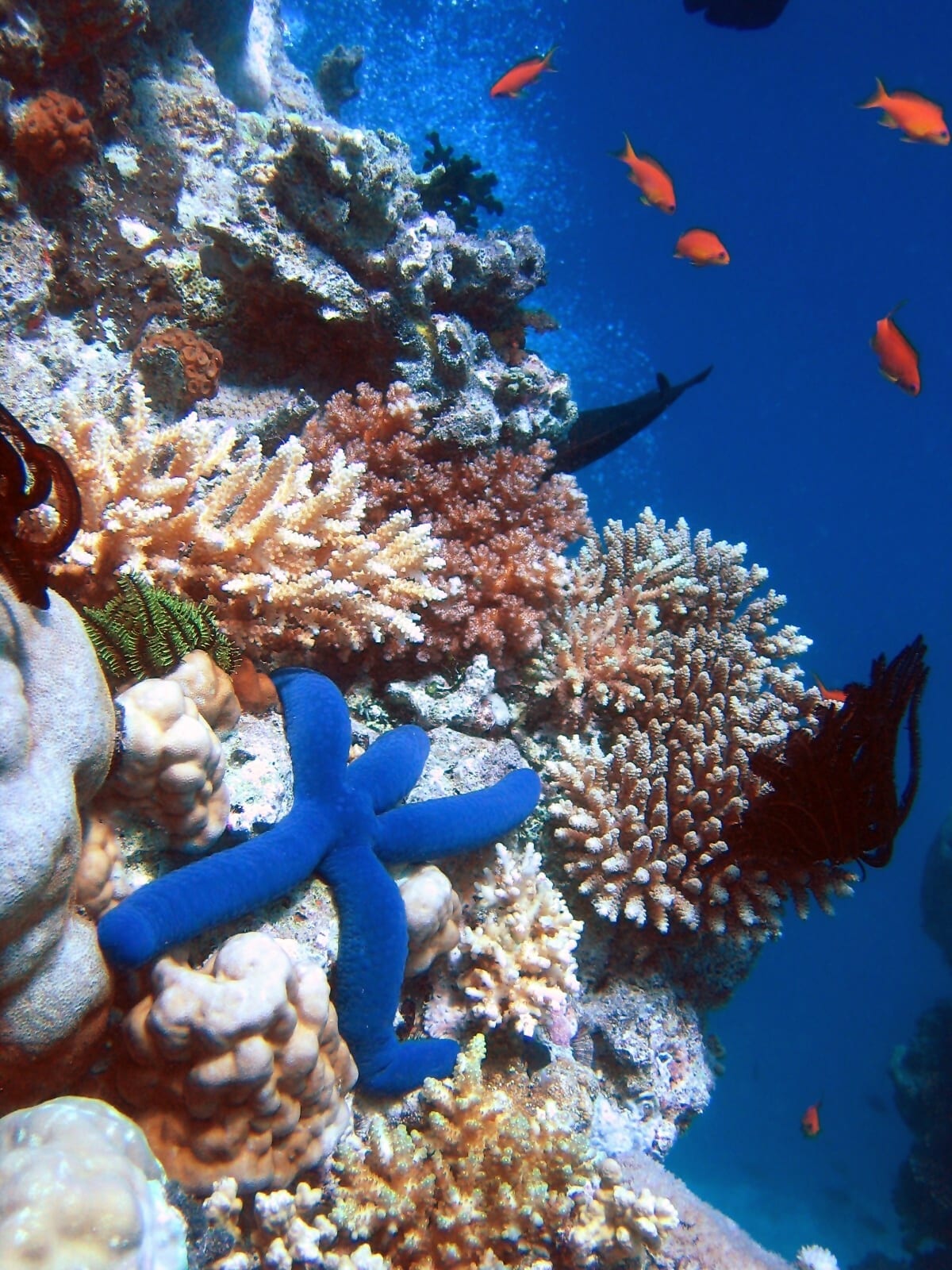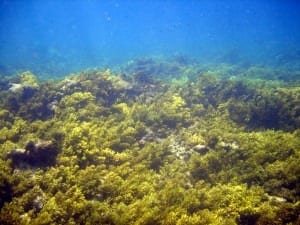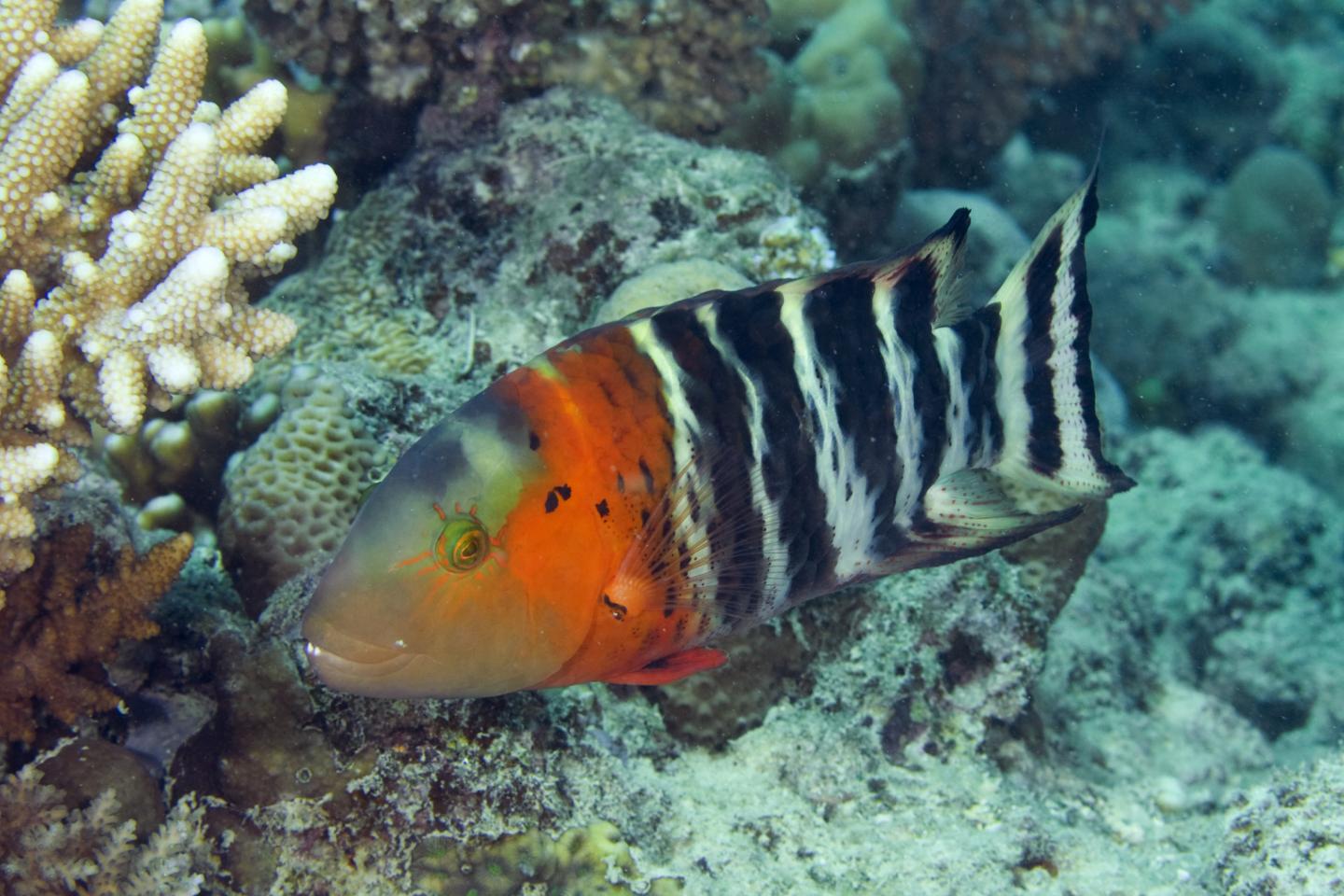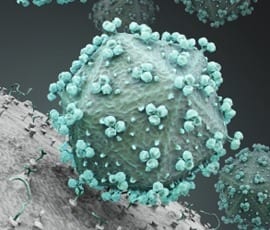
Shocks caused by climate and seasonal change could be used to aid recovery of some of the world’s badly-degraded coral reefs, an international team of scientists has proposed.
A new report by Australian and Swedish marine scientists in the journal Frontiers in Ecology and the Environment suggests that it may be possible to restore living coral cover to a badly-degraded reef system – though not easy.
With 70 per cent or more of the world’s coral reefs now assessed as degraded, adopting a business-as-usual approach to how we use and manage reefs is no longer an option, says lead author of the report Nick Graham.
“We are unlikely to be able to keep many of the world’s reefs in a pristine state, but with good management we may be able to maintain them in a coral-dominated condition and in some cases we may be able to bring back reefs from a degraded state,” he explains.
The researchers have taken heart from examples on land in desertified landscapes; exceptional falls of rain, in combination with controls on grazing pressure, can result in widespread regrowth of natural vegetation.
They argue that coral reef managers may be able to take advantage of shocks like tropical storms, periods of cloudy weather or even strong seasonal effects on abundance to restore coral cover on degraded reefs.
“Normally we think of these shocks as damaging to coral reefs – but research suggests they are just as damaging to the organisms that can replace coral. In other words, they may act as a circuit-breaker that allows corals to regain control of a reef.”
The key to the new thinking is resilience: healthy corals reefs are naturally resilient to shocks – but damaged ones may become overgrown with sea weeds, and the corals vanish.
“Weed-dominated systems are pretty resilient too and, once established, it is very hard to restore the corals,” Dr Graham explains.

“However a weed-dominated reef can be damaged by big storms too. Cloudy weather and seasonal changes in water temperature can also cause the weeds to die back.
“This dieback of weeds opens a window through which corals can re-establish.”
The key to bringing back corals is exactly the same as preventing coral cover being lost in the first place, Dr Graham says – reducing human impacts through regulation of fisheries and water quality. If reefs are prepared in this way, they may bounce back when a window for recovery opens.
The Latest Bing News on:
Coral reefs
- Bleaching of coral reefs shows severe ocean circulation changeson May 8, 2024 at 9:10 pm
A new paper in Oxford Open Climate Change indicates that extensive bleaching and deaths are widespread at several major coral reefs around the world. This suggests that climate change has resulted in ...
- Marine heat waves: coral reefs in Sri Lankan waters risk die-offson May 8, 2024 at 8:07 pm
Coral reefs in the sea around Sri Lanka risk die-offs if the current marine heat level persists for another one month or so, a top scientist said yesterday. ..
- Coal vs coral: A boat trip to the Barrier Reef shows our climate cultural cringe on full displayon May 8, 2024 at 6:32 pm
Australia is both coal and coral. They are not enemies, but rather part of a larger story of people and communities.
- Academy of Sciences helps battle coral bleaching while developing new technologieson May 8, 2024 at 6:23 pm
Bay Area researchers are helping to better understand the damage from a worldwide event that's threatening coral reefs from Australia to Florida.
- Stony Coral Disease Is Reshaping Caribbean Reefson May 7, 2024 at 2:04 am
The outbreak of a deadly disease called stony coral tissue loss disease is destroying susceptible species of coral in the Caribbean, reshaping the reef landscape.
- Why are Lakshadweep coral reefs undergoing severe bleaching?on May 6, 2024 at 4:09 am
Bleaching leaves corals exposed to disease and starvation, and has major consequences for their long term health.
- Coral disease is pushing Caribbean reefs toward extinctionon May 5, 2024 at 10:00 am
The health of Caribbean reefs is under threat from a virulent disease known as Stony Coral Tissue Loss Disease (SCTLD) ...
- ‘Like wildfires underwater’: Worst summer on record for Great Barrier Reef as coral die-off sweeps planeton May 4, 2024 at 2:00 pm
As the early morning sun rises over the Great Barrier Reef, its light pierces the turquoise waters of a shallow lagoon, bringing more than a dozen turtles to life.
- Stony coral tissue loss disease is shifting the ecological balance of Caribbean reefson May 3, 2024 at 3:27 pm
A new study shows stony coral tissue loss disease is causing drastic changes in the Caribbean's population of corals, which is sure to disrupt the delicate balance of the ecosystem and threaten marine ...
- Have the world’s coral reefs already crossed a tipping point?on April 28, 2024 at 5:00 pm
Tourists snorkel in the Great Barrier Reef in early April, swimming above bleached and dead coral. David Gray / AFP via Getty Images Bleaching doesn’t spell certain death, but the corals that ...
The Latest Google Headlines on:
Coral reefs
[google_news title=”” keyword=”Coral reefs” num_posts=”10″ blurb_length=”0″ show_thumb=”left”]
The Latest Bing News on:
Badly-degraded coral reefs
- coral bleachingon April 27, 2024 at 5:00 pm
Coral reefs across the globe once again endure mass bleaching amid warming oceans, scientists say Coral reef bleaching across happens when stressed coral expel the algae that are their food source ...
- coral reefson April 21, 2024 at 5:00 pm
Nearly a quarter of all ocean species rely on the reefs. William… Coral reefs across the globe once again endure mass bleaching amid warming oceans, scientists say Coral reef bleaching across ...
- Restoring Our Reefson April 21, 2024 at 11:00 am
light and water conditions to trick coral into spawning on demand and more often, with the aim of breeding millions of corals that can be planted out onto degraded reefs. Coral reefs are complex ...
- Scientists’ experiment is ‘beacon of hope’ for coral reefs on brink of global collapseon April 20, 2024 at 12:52 pm
Recordings of healthy fish are being transmitted to attract heat-tolerant larvae back to degraded reefs in the Maldives An underwater experiment to restore coral reefs using a combination of ...
- Coral reefs could soon experience global bleaching eventon April 17, 2024 at 11:22 am
Coral reefs all over the world are dying ... We were hoping what happened here in Florida last summer wasn’t going to be as bad in other parts of the world, but it turns out it is actually ...
- Coral reefs undergo what may become the most extensive bleaching event on recordon April 17, 2024 at 2:06 am
And how bad is it for reefs ... with business-as-usual greenhouse gas emissions, then the world's coral reefs will simply be degraded and no longer recognizable for the next generation.
- Coral reefs can't keep up with climate change. So scientists are speeding up evolutionon April 17, 2024 at 2:00 am
Record levels of heat in the ocean are causing a worldwide mass bleaching event on coral reefs. It's the second ... that relationship is increasingly going bad. When ocean temperatures rise ...
- Scientists say Earth is in 4th coral bleaching event amid rising ocean temperatureson April 16, 2024 at 5:01 pm
Coral reefs around the world are experiencing a mass bleaching event as the climate crisis drives record-breaking ocean heat, two scientific bodies announced Monday - with some experts warning ...
The Latest Google Headlines on:
Badly-degraded coral reefs
[google_news title=”” keyword=”badly-degraded coral reefs” num_posts=”10″ blurb_length=”0″ show_thumb=”left”]










